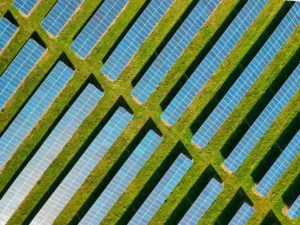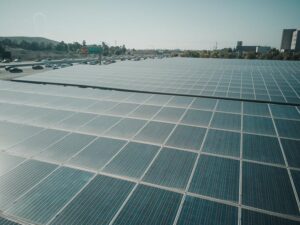Solar panels typically last between 25 to 30 years, making them a reliable energy source. With proper maintenance, this lifespan can be extended further. Factors like installation quality and local weather conditions can influence longevity. Regular cleaning and annual professional inspections are vital to maintain performance and detect any issues early. Watching for signs of aging, such as reduced energy output or physical damage, can help guarantee your investment remains effective. Understanding these aspects is significant for making informed decisions about solar energy. Explore more about how you can maximize the lifespan and efficiency of your solar panels.
Average Lifespan of Solar Panels
When considering solar panels, one of the most common questions is about their lifespan. On average, modern solar panel technology can last between 25 to 30 years. This durability is a significant factor when you think about the environmental impact of solar energy. With proper maintenance, many panels still produce energy effectively even after their estimated lifespan. It's essential to recognize that while the efficiency may decrease over time, most panels are designed to withstand various weather conditions, ensuring long-term reliability. By investing in solar panels, you're not only contributing to a sustainable future but also securing a consistent energy source for decades. Understanding this lifespan helps you make informed decisions about your energy needs and environmental responsibility.
Factors Influencing Longevity
The lifespan of solar panels isn't just determined by their manufacturing quality; several factors can influence how long they'll last and operate efficiently. One vital aspect is installation quality. If your panels aren't installed correctly, they may suffer from issues like water damage or inadequate sunlight exposure. Additionally, the environmental impact plays a significant role. Panels exposed to harsh weather conditions, like heavy snow or intense winds, may degrade faster. Regular maintenance and checks can mitigate some of these risks. Think about where you live and how the climate may affect your solar system. Understanding these factors can help you make informed decisions, ensuring your investment provides energy for many years to come.
Maintenance Tips for Longevity
To keep your solar panels running efficiently for years to come, regular maintenance is key. You should incorporate proper cleaning techniques and adhere to an inspection frequency that works for your system. Cleaning your panels every six months can help remove dirt and debris that block sunlight. Inspections should occur at least once a year to check for any damage or wear.
Here's a quick reference table:
| Maintenance Task | Frequency |
|---|---|
| Panel Cleaning | Every 6 months |
| Visual Inspection | Every 6 months |
| Professional Service | Annually |
| Wiring Check | Annually |
| Inverter Inspection | Annually |
Performance Over Time
Regular maintenance not only prolongs the life of your solar panels but also guarantees their performance remains ideal over time. Over the years, solar panels can experience performance degradation, leading to efficiency loss. It's essential to understand that while some degradation is normal, you can take steps to minimize it.
Here are some key factors to contemplate:
- Regular cleaning to remove dirt and debris
- Monitoring system performance for drops in energy output
- Professional inspections to identify potential issues early
- Ensuring proper shading and ventilation around panels
Signs of Aging Solar Panels
As solar panels age, certain signs can indicate that they may not be performing at their best. One primary concern is panel degradation, which can lead to noticeable efficiency loss. You might observe a decline in energy production, especially during peak sunlight hours. Additionally, physical signs like discoloration, cracking, or warping can suggest that your panels are deteriorating. If you notice a significant drop in output, it could be time to assess their condition. Regular maintenance and inspections can help identify these issues early. By addressing signs of aging, you can guarantee your solar investment remains effective and continues to provide you with clean energy for years to come. Consider consulting a professional for a thorough evaluation.
Frequently Asked Questions
What Warranties Do Solar Panels Typically Come With?
When considering solar panels, you'll find warranties typically range from 10 to 25 years. Most panels also include a performance guarantee, ensuring they maintain a certain efficiency level throughout the warranty duration.
Can Solar Panels Be Repaired if Damaged?
Yes, solar panels can be repaired if damaged. You'll need a damage assessment to identify issues, followed by appropriate repair techniques. Addressing minor problems quickly can extend your panels' lifespan and efficiency considerably.
How Do Weather Conditions Affect Solar Panel Lifespan?
Weather conditions considerably impact solar panels' lifespan. Extreme temperatures, heavy snowfall, or hail can cause wear over time. Considering your climate's specific challenges will help you choose the right panels for longevity and performance.
Are There Specific Brands Known for Longer-Lasting Solar Panels?
When considering brand comparisons, some manufacturers are known for their durability ratings. You might want to look at brands like SunPower or LG, which often receive higher marks for longevity and performance in various conditions.
What Happens to Solar Panels at the End of Their Life?
When solar panels reach their end of life, you can explore recycling options. Many manufacturers offer end-of-life processes to safely dispose of or recycle materials, reducing environmental impact and promoting sustainability in renewable energy.
Conclusion
In summary, solar panels typically last 25 to 30 years, depending on several factors like quality and maintenance. Regular upkeep can greatly enhance their lifespan and performance. By understanding the signs of aging, you can make informed decisions about repairs or replacements. Investing in solar energy is a long-term commitment, and staying proactive guarantees you maximize your system's efficiency. If you need further assistance or have questions, our team is here to help you navigate your solar journey.


